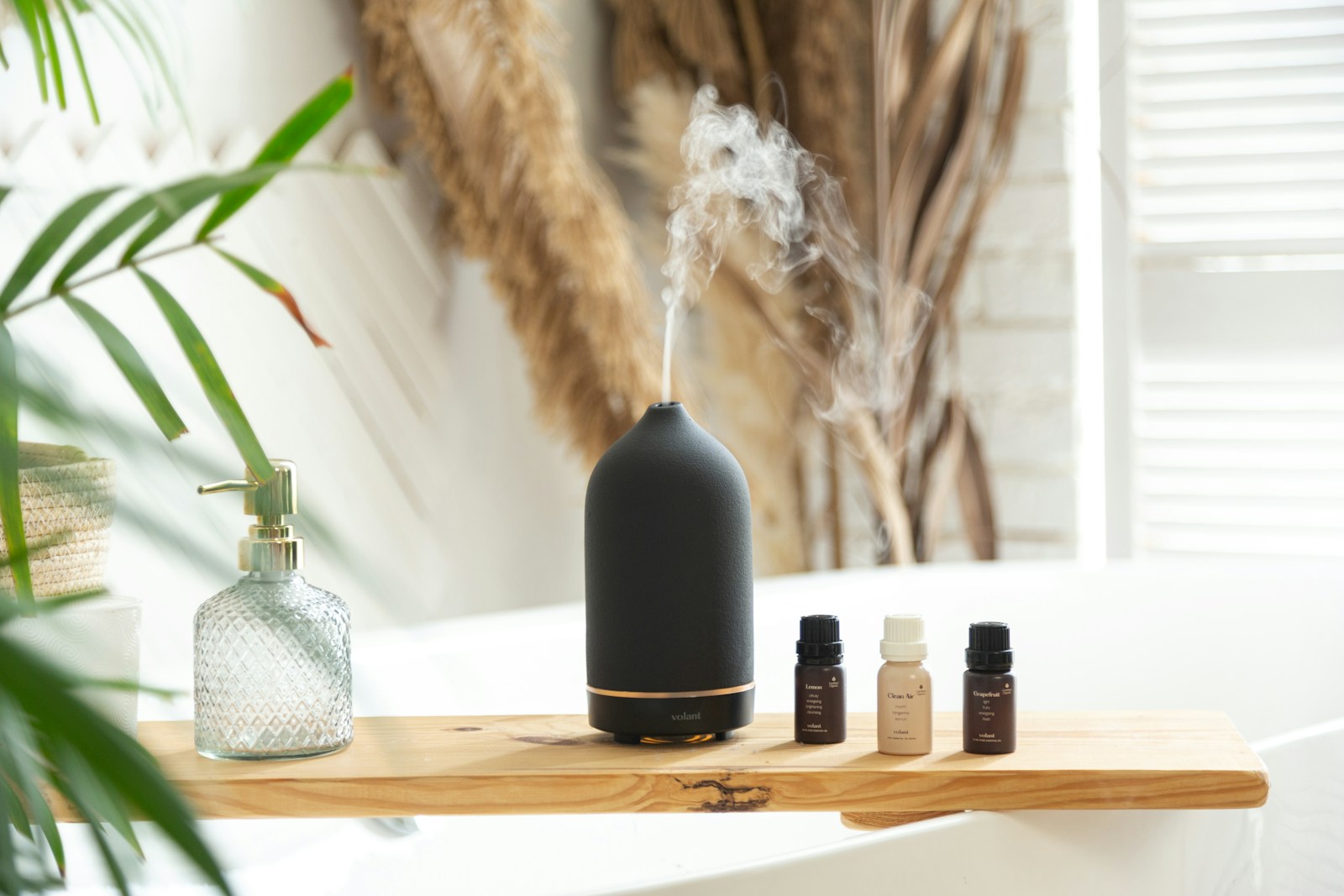TL;DR:
– Aromatherapy harnesses natural scents for holistic well-being, aiding in stress reduction, sleep improvement, and physical wellness.
– Key essential oils like Lavender, Peppermint, Eucalyptus, Tea Tree, and Chamomile offer unique benefits for relaxation, energy, immunity, and inflammation.
– Various application methods such as inhalation, topical use, and diffusion enhance the therapeutic effects of aromatherapy blends.
– Tailored blends address specific needs like relaxation, focus, and mood enhancement, elevating mental and emotional states.
– Safety precautions emphasize dilution, allergy awareness, and expert consultation for maximizing benefits and minimizing risks.”
Introduction
Embark on a sensory journey with the powerful world of Aromatherapy. As a seasoned advocate of holistic wellness, I’ve witnessed firsthand the remarkable impact of essential oils on mind, body, and spirit. In this insightful blog post, we delve into the core essence of Aromatherapy, uncovering the transformative properties of five essential oils. From the soothing whispers of lavender to the invigorating aura of peppermint, each oil possesses a unique key to unlocking holistic balance. Join me on this aromatic exploration as we harness nature’s gifts for a harmonious well-being journey. Welcome to Aromatherapy 101: where nature’s essence meets holistic wellness.
Benefits of Aromatherapy
Have you ever wondered how a simple scent can transform your mood or ease your mind? Aromatherapy, the practice of using essential oils to promote holistic healing, offers a myriad of benefits for both the body and mind. Let’s explore how aromatherapy can help reduce stress and anxiety, improve sleep quality, and provide physical wellness.
Can Aromatherapy Help Reduce Stress and Anxiety?
– Aromatherapy is known for its calming effects on the nervous system, helping to reduce stress and anxiety levels.
– Essential oils like lavender, chamomile, and bergamot are often used to promote relaxation and emotional well-being.
How Does Aromatherapy Improve Sleep Quality?
– Certain essential oils, such as lavender and cedarwood, are renowned for their sedative properties, aiding in promoting a restful night’s sleep.
– Inhalation or diffusion of these oils before bedtime can create a soothing atmosphere conducive to deep relaxation.
What are the Physical Benefits of Aromatherapy?
– Aromatherapy not only impacts mental health but also offers physical benefits such as pain relief, improved circulation, and enhanced immunity.
– Essential oils like peppermint, eucalyptus, and tea tree possess antimicrobial and anti-inflammatory properties, supporting overall wellness.
Unveil the powerful potential of aromatherapy to enhance your well-being and cultivate a harmonious balance between mind, body, and spirit.
Top 5 Essential Oils for Aromatherapy
When it comes to aromatherapy, essential oils play a crucial role in promoting holistic wellness. These natural extracts not only offer delightful scents but also provide therapeutic benefits for the mind and body. Let’s explore the top 5 essential oils that are highly favored for their unique properties in aromatherapy:
Lavender: The Ultimate Relaxation Oil
– Lavender essential oil is renowned for its calming and soothing effects, making it ideal for reducing stress and anxiety.
– Its floral aroma promotes relaxation and helps improve sleep quality, making it a popular choice for bedtime rituals.
Peppermint: Energizing and Refreshing Properties
– Peppermint essential oil is known for its invigorating and energizing properties, helping to boost focus and mental clarity.
– Its minty aroma is refreshing and revitalizing, making it a great choice for enhancing alertness and mood.
Eucalyptus: Clearing Sinuses and Boosting Immunity
– Eucalyptus essential oil has a fresh and clean scent that helps clear congestion and promote respiratory health.
– Its antibacterial properties can boost immunity and support overall wellness, especially during seasonal changes.
Tea Tree: Anti-Inflammatory and Antimicrobial Benefits
– Tea Tree essential oil is prized for its strong antimicrobial and anti-inflammatory properties, making it effective for treating skin issues.
– Its medicinal aroma is purifying and cleansing, making it a valuable addition to aromatherapy blends for holistic well-being.
Chamomile: Soothing and Calming Effects
– Chamomile essential oil is known for its gentle and calming properties, ideal for promoting relaxation and reducing tension.
– Its sweet and herbaceous aroma is soothing and comforting, making it a popular choice for stress relief and emotional balance.
Methods of Aromatherapy Application
Aromatherapy offers a versatile range of methods for harnessing the natural benefits of essential oils. Whether you seek relaxation, mental clarity, or immunity support, these application techniques can enhance your well-being effectively.
Inhalation: The Power of Aromas
Inhalation is one of the most common and impactful ways to experience aromatherapy. By diffusing essential oils into the air through a diffuser or inhaler, you can benefit from the aromatic molecules that stimulate your olfactory system. This method can help reduce stress, boost mood, and promote relaxation.
Topical Application: Absorbing Through the Skin
Applying essential oils directly to the skin through massage, compresses, or baths allows the oils to be absorbed into the bloodstream. This method targets specific areas for relief, such as sore muscles or skin conditions, providing both physical and emotional benefits.
Diffusion: Creating a Tranquil Atmosphere
Diffusing essential oils into the air not only enhances the scent of a room but also promotes various wellness benefits. A diffuser disperses the oils into tiny particles, allowing them to linger in the air and be inhaled, providing a continuous aromatic experience that can uplift your mood, improve focus, or induce relaxation.
Start integrating these aromatherapy application techniques into your daily routine to experience the holistic benefits of essential oils.
Aromatherapy Blends for Different Purposes
The art and science of aromatherapy are not just about using single essential oils but also blends that are known to create specific desired effects. By combining certain essential oils in precise proportions, you can create aromatherapy blends to serve various purposes.
Calming Blend for Relaxation
Experiencing high stress levels or occasional bouts of anxiety? A calming blend can be your solace. This blend can include Lavender, a popular relaxation inducer, and Chamomile, renowned for its soothing prowess. Together, they can help to relieve stress and induce a state of calmness.
Focus Blend for Mental Clarity
Struggling with concentration? A focus blend might be your elixir. Consider oils like Peppermint and Rosemary that are known for their stimulating and clarifying properties. These can improve cognitive performance and enhance mental clarity, making them ideal for tasks that require sustained focus.
Uplifting Blend for Mood Enhancement
Feeling low and unenergetic? An uplifting blend could come to your rescue. Citrus oils such as Lemon or Orange, coupled with invigorating Peppermint, can offer a quick mood boost. Ultimately, creating these aromatherapy blends serves the purpose of enhancing your holistic wellness journey, further empowering the use of aromatherapy as a tool for overall well-being.
Benefits of Aromatherapy
Do you often find yourself seeking ways to reduce stress and anxiety in your daily life? Aromatherapy might just be the answer you’ve been looking for. This holistic practice harnesses the power of essential oils to promote relaxation, ease tension, and enhance overall well-being. By incorporating aromatherapy into your routine, you can experience a myriad of benefits that contribute to a healthier, more balanced lifestyle.
Can Aromatherapy Help Reduce Stress and Anxiety?
Aromatherapy has been shown to have a calming effect on the mind and body, making it an effective tool for managing stress and anxiety. Certain essential oils, such as lavender and chamomile, are known for their soothing properties and can help promote feelings of relaxation and tranquility. By incorporating these oils into your daily routine through diffusion or topical application, you can harness their natural stress-relieving benefits.
How Does Aromatherapy Improve Sleep Quality?
Struggling to get a good night’s sleep? Aromatherapy may be the key to unlocking a restful night of slumber. Essential oils like lavender and eucalyptus have been shown to promote relaxation and create a calming atmosphere conducive to sleep. By incorporating these oils into your bedtime routine, you can improve sleep quality, enhance relaxation, and wake up feeling refreshed and rejuvenated.
What are the Physical Benefits of Aromatherapy?
Beyond its mental health benefits, aromatherapy can also have positive effects on the body. Essential oils like peppermint and tea tree have invigorating and anti-inflammatory properties that can help alleviate physical discomfort and promote overall wellness. Whether used for massage, inhalation, or diffusion, aromatherapy can be a powerful tool for enhancing both mental and physical health.
Stay tuned for our next section where we explore the top essential oils for aromatherapy and how they can benefit your holistic wellness journey.
Conclusion:
In the realm of Aromatherapy, these 5 essential oils have unveiled a world of holistic wellness possibilities. From the calming embrace of lavender to the invigorating scent of peppermint, each essence offers a unique path to balance and rejuvenation. By integrating Aromatherapy into your self-care routine, you can unlock the transformative power of nature’s healing touch. Dive deeper into the aromatic world of Aromatherapy and uncover the myriad benefits waiting to enhance your well-being. Embrace the essence of Aromatherapy and let nature’s fragrant wisdom guide you on the path to holistic wellness.










